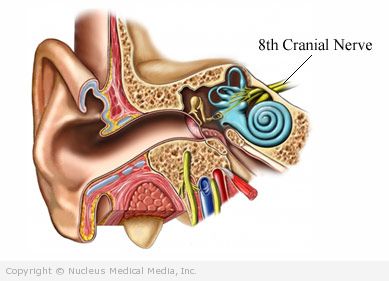Acoustic Neuroma
(Neurilemoma; Vestibular Schwannoma; Acoustic Schwannoma)
Acoustic Neuroma – Definition
An acoustic neuroma is a tumor that grows on the nerve leading from the brainstem to the ear. This nerve play a role in hearing and maintaining your balance. Acoustic neuromas grow relatively slowly. It is a benign tumor which mean it is not cancer. However, this condition can still cause serious problems.
Acoustic Neuroma – Causes
The exact cause of an acoustic neuroma is unknown.
Acoustic Neuroma – Risk Factors
Factors that may increase your chance of an acoustic neuroma include:
- Age: 30-60 (average age of diagnosis is 50)
- History of the disease neurofibromatosis type 2 (NF2)
- Family history of NF2
Acoustic Neuroma – Symptoms
The first symptoms of an acoustic neuroma include:
- Gradual hearing loss in one ear with near normal hearing in the other ear
- Decrease in sound discrimination, especially when talking on the telephone
- Ringing in the affected ear, called tinnitus
As the neuroma gradually grows larger, symptoms may include:
- Balance problems
- Facial numbness and tingling
- Weakness of the facial muscles on the side of the tumor
If headaches or mental confusion occurs, the tumor may be life-threatening. Call your doctor right away.
Acoustic Neuroma – Diagnosis
The doctor will ask about your symptoms and medical history. Your ears will be examined. Your doctor will also do tests for your nervous system. Tests may include:
- Audiogram — a test that measures hearing in both ears
- Auditory brainstem response test — a test that measures the rate of electric impulses traveling from the inner ear to the brainstem, almost always abnormal in the presence of an acoustic neuroma
- Electronystagmography — Cold and warm water or air is inserted in the ear canal, and the resulting dizziness and rapid eye movement are recorded.
- MRI scan — a test that uses magnetic waves to make pictures of the inside of the head
- CT scan — a type of x-ray that uses a computer to make pictures of the inside of the head
Acoustic Neuroma – Treatment
Treatment depends on your age, general health, the size and location of the tumor, and its rate of growth. Treatment may include:
Observation
If the tumor is very small, your doctor may just monitor its growth. This is common among people over age 70.
Microsurgical Removal
As the tumor grows and/or hearing becomes impaired, removal of the tumor may be necessary. The type of surgery depends on the size and location of the tumor. Complications of surgery may include permanent hearing loss and/or paralysis of facial muscles on the affected side.
Radiation Therapy
Radiation therapy is the use of radiation to kill cells and shrink tumors. Radiation is expected to prevent further growth of the tumor. Radiation may be used when tumors are small and surgery is not possible. This method may preserve hearing. It may be given over several treatments or one large dose. You may be treated with a procedure called stereotactic radiosurgery. This surgery uses a beam of radiation to destroy the tumor tissue.
Acoustic Neuroma – Prevention
There are no guidelines for preventing acoustic neuroma because the cause is not usually known.

